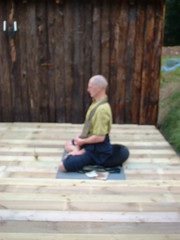Naturally Becoming One Piece
"JI-JO-IPPEN means the state of Zazen, when we concentrate our efforts to keep our posture into the perfectly regular posture, and so we can feel our consciousness as if our posture had become only one piece." Gudo Wafu Nishijima



2 Comments:
Just sitting is a spontaneous process -- once it gets going it tends to do itself. The problem is how to stimulate it.
Behind Gudo’s words there is intuitive recognition of the above, but his words themselves, as all words, are very open to misunderstanding.
This practice, Zazen, if we are sincere about it, constantly makes a fool of us. We have a good experience--an experience, say of really feeling all in one piece, of being caught by the still state, of becoming one with Nature--and think we have solved the problem.
So we go back to the zafu expecting that now, armed with our solution to the problem, we will swiftly enter into the spontaneous process again.
But it doesn’t happen. The expectation itself is in the way, for a start. The kind of thinking that works is never the kind of thinking that I thought would work. It seems to me that one important element of HI-SHIRYO, non-thinking, might be a well developed sense of humour.
Our vestibular system myelinated at around 6 months after our conception. Thus, we came into the world already armed by nature with a weapon, albeit imperfectly developed, that we use unconsciously. That weapon is feeling. If the senses of mother and baby are working as nature intended, the baby will emerge into the world head first, and the mother will allow the baby to do so, mainly because their vestibular systems are working well.
In my case, as in the case of very many people, my vestibular system was and still is imperfectly developed. I still tend to get car sick, for example, if I try to read in a car. I get car sick because my senses (i.e. in this case eyes and ears) are imperfectly integrated. Sensory integration is the job primarily of the vestibular system.
If you are interested in reading further, you can follow the links on my web-page at the-middle-way.org.
FM Alexander was acutely aware of the problem of what he called “unreliable sensory appreciation.” It was the central theme of his second book, Constructive Conscious Control of the Individual.
When our feeling is wonky, it behoves us to arm ourselves with an alternative weapon: what Dogen and Alexander called “thinking.”
I think that maybe my mission in life is to clarify exactly the relation between feeling, thinking, and action.
Feeling is not thinking. And thinking is not action.
Thinking itself does not hit the target. In Zazen, it is impossible for thinking to hit the target.
There is a kind of thinking, however, that makes it possible for the target, in odd moments, to hit me.
It is not only thinking with the brain in the head; it is thinking in which the whole body becomes a brain -- non-thinking.
“Thinking does not hit the target, but thinking can make it possible for the target to hit me.”
This, I think, is a universal law of Buddhist enlightenment. But not all buddhas clearly recognize it.
I think that when Master Dogen came back from China in 1227, although he was already an enlightened buddha, he still hadn’t clearly recognized the role that thinking played in his Zazen.
This kind of situation is not unusual in human life. We use faculties all the time without being aware of what they are -- the vestibular system being a case in point.
Therefore in Fukan-zazen-gi Shinpitsu-bon, Master Dogen didn’t refer to thinking -- except in the sense of negating intellectual effort; that is, he negated thinking only with the brain. But after several years, having clearly recognized the principle of the other kind of thinking, non-intellectual thinking, he inevitably wanted to express it, and so he revised his instruction.
These are my secret thoughts about why Master Dogen revised Fukan-zazen-gi. For the time being, please don’t tell anybody.
Post a Comment
<< Home